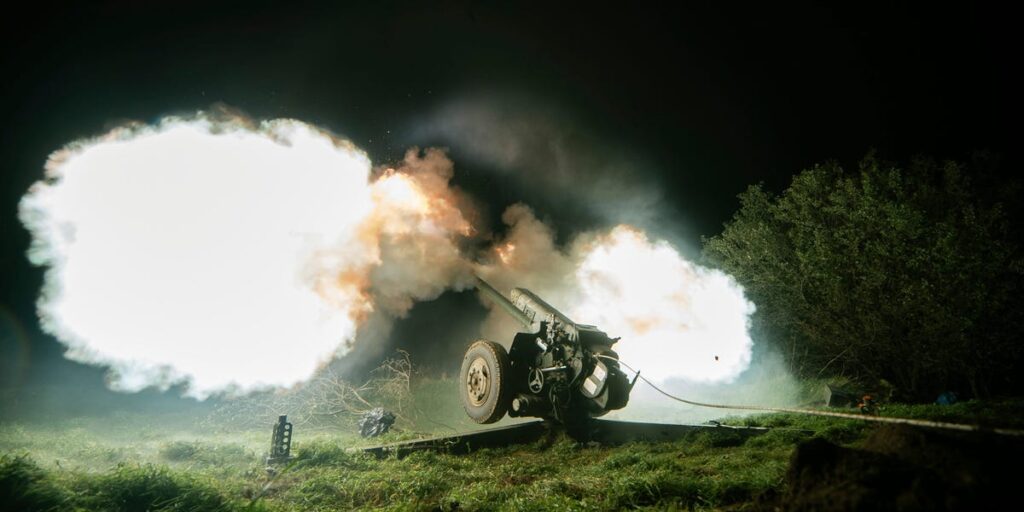- Donald Trump won the presidential election Wednesday, clearing the way for his return to the White House.
- His past rhetoric has raised concerns over the future of US security assistance to Ukraine and support for NATO.
- But in a new op-ed, the NATO chief said the military alliance can’t afford to stop supporting Kyiv.
Former president Donald Trump’s victory in the US presidential election on Wednesday has amplified long-standing concerns about the future of American support for Ukraine as the grinding war against Russia continues.
Against this backdrop, the head of NATO is warning that the military alliance can’t afford to stop providing Kyiv with the security assistance it needs to fight the Russians. The Ukrainian defenders are facing a precarious moment in the war as Moscow’s troops gain momentum in the east and the arrival of North Korean troops signals, as NATO leadership said, that “darker” times may lie ahead.
“Since the start of Russia’s full-fledged invasion, NATO allies have provided more than 99 percent of all military support to Ukraine,” Mark Rutte, the former Dutch prime minister who became NATO’s secretary general in October, wrote in an op-ed published by POLITICO on Wednesday.
“And we’re on track to deliver on the financial pledge of 40 billion in military aid to Ukraine this year,” Rutte said, adding that “what we need now is the political commitment to stay the course for the long haul.”
“So far, our support has kept Ukraine in the fight. But we need to do much more in order to shift the conflict’s trajectory. We need to raise the cost for Putin and his enabling authoritarian friends,” he said, referring to the leaders of China, Iran, and North Korea, which have been accused of supporting and fueling Moscow’s war efforts.
Rutte’s op-ed focused on the recent deployment of North Korean soldiers to Russia to fight against Ukraine. It did not mention Trump, nor did it single out the US over its military support.
But the article comes at an influential moment. Trump has long been critical of NATO and some member states over their defense spending. He has also repeatedly expressed concerns about the large amount of security assistance the US has sent to Ukraine.
The Biden administration has given Ukraine over $60 billion in military aid since Russia launched its full-scale war in February 2022. NATO countries have also provided Kyiv with tens of billions of dollars in security assistance during this time.
NATO countries have sent Ukraine fighter jets, drones, tanks, armored vehicles, missiles, rockets, artillery shells, bombs, guns, bullets, and more lethal aid in what leaders have described as an investment to defend European security.
“Backing Ukraine costs a fraction of our annual military budgets,” Rutte said. “That’s a small price to pay for peace. The question is, can we afford not to?”
Ukrainian President Volodymyr Zelenskyy, who met with Trump in September, was among the first world leaders to send a congratulatory note on Trump’s election win.
“Ukraine, as one of Europe’s strongest military powers, is committed to ensuring long-term peace and security in Europe and the Transatlantic community with the support of our allies,” he wrote on social media, saying he hoped to work with Trump to strengthen bilateral ties with the US.
In Ukraine and in countries across Europe, there has been concern throughout the election season that a Trump win could threaten support for Ukraine, especially after an earlier Republican logjam in Congress in which Trump was involved hindered Ukrainian defensive operations for months.
At a consequential NATO summit in Washington over the summer, NATO unveiled plans to assume more control over Western efforts to arm and train Ukraine’s military. The move was seen as an effort to protect long-term support for the country from political uncertainty in the US, Kyiv’s biggest provider of weapons.
Laurynas Kasčiūnas, Lithuania’s defense minister, said at the time that there is no “safe and secure” Europe without US support, adding that NATO “should be prepared to work” with whoever wins the White House.
Months later, as news broke on Wednesday of Trump’s victory, NATO allies seemed to adhere to this approach, with several leaders offering congratulatory messages and expressing their desires to continue close defense cooperation with the US.
In a social media post earlier in the day, Rutte said he congratulated Trump on winning the election. “His leadership will again be key to keeping our Alliance strong. I look forward to working with him again to advance peace through strength” through NATO, he wrote.
Read the full article here


